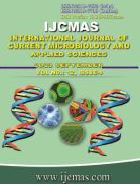


 National Academy of Agricultural Sciences (NAAS)
National Academy of Agricultural Sciences (NAAS)

|
PRINT ISSN : 2319-7692
Online ISSN : 2319-7706 Issues : 12 per year Publisher : Excellent Publishers Email : editorijcmas@gmail.com / submit@ijcmas.com Editor-in-chief: Dr.M.Prakash Index Copernicus ICV 2018: 95.39 NAAS RATING 2020: 5.38 |
One of the most important plant families in traditional medicine and human nutrition is the family Solanaceae. In the Solanaceae family, there are several plants that are rich in bioactive metabolites and have been used for centuries by many tribes. There has been a surge in interest in plant-derived antimicrobial phyto-molecules in recent years, raising the prospect of finding novel antimicrobial medicines to combat antibiotic resistance. Based on the inclusion and exclusion criteria, a systematic literature review was undertaken using a variety of databases. Solanaceae plants yielded phyto-molecules having antibacterial potential, which were found to be a part of the plants' natural defenses. Plant and human pathogens were both successfully combated with these compounds' antibacterial, antifungal, and antiviral properties. Solanum nigrum, Datura metel, Withania somnifera & Physalis minima are the most commonly studied genera for antibacterial potential. Comparable to other antimicrobials, phyto-molecules from Solanaceae had similar modes of action, such as altering membrane potential and permeability, the creation of membrane pores, and cell aggregates. It has long been known that plants in the genus Solanaceae have been utilized for medicinal and toxic purposes. Solanaceae phyto-molecules are the byproducts of chemical shields used by plants to defend themselves against microbes. Database review is intended to summarize documented phyto-molecules from plants in the Solanaceae family with antimicrobial potential, as well as to correlate their traditional and therapeutic usage with their reported antimicrobial effects.
 |
 |
 |
 |
 |